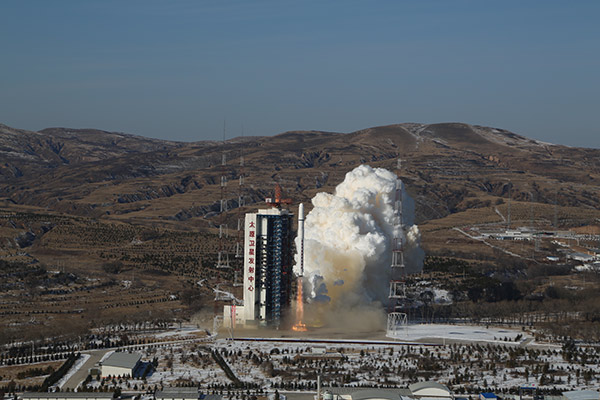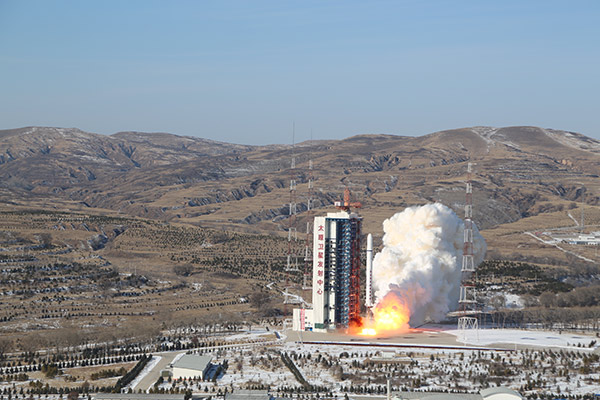
A Long March 2D rocket carrying a pair of 0.5-meter high-resolution remote sensing satellites, SuperView-1 01/02, blasts off from the launchpad at the Taiyuan Satellite Launch Center in North China’s Shanxi province, Dec 28, 2016. The satellites are able to provide commercial images at 0.5-meter resolution. [Photo/Xinhua]
China launched two commercial remote-sensing satellites on Dec 28 in an attempt to break foreign companies’ dominance in high-resolution ground images.
The SuperView 1A and 1B were lifted atop a Long March 2D carrier rocket at 11:23 am from the Taiyuan Satellite Launch Center in Shanxi province, according to China Aerospace Science and Technology Corp, developer of the satellite series.
The two identical satellites will be part of the SuperView network of at least 24 Earth observation satellites, which the State-owned CASC expects to become one of the world’s largest commercial providers of space imagery and geospatial data, said Yang Yike, director of high-resolution satellite projects at the company.

A Long March 2D rocket carrying a pair of 0.5-meter high-resolution remote sensing satellites, SuperView-1 01/02, blasts off from the launchpad at the Taiyuan Satellite Launch Center in North China’s Shanxi province, Dec 28, 2016. The satellites are able to provide commercial images at 0.5-meter resolution.[Photo/Xinhua]
After the SuperView 1A and 1B are placed in their positions 500 km above Earth, they will start to take pictures of Earth with ground image resolution of 0.5 meter-the clearest yet produced by Chinese commercial satellites, he said.
China now operates the Gaofen network that has four satellites in service, but the system mainly serves government departments and the public sector rather than businesses, Yang said.
“We want to build a commercial network that will consist of 16 optical satellites like the SuperView 1A and 1B, four optical satellites that are more advanced, four radar satellites as well as several mini-satellites,” he said. “We will arrange one to two launches for the network each year from 2017 to 2022. The whole system will be built by 2022.”
Xu Liping, general manager of Beijing Space View Technology Co, distributor of images and data generated by SuperView satellites, said government departments, public institutions and companies are expected to spend 500 million yuan ($71.9 million) on the procurement of 2.5-m-resolution or clearer images, adding that foreign companies account for about 75 percent of this market. In addition, all of the highest-definition images, such as the 0.5-m-resolution ones now available on the Chinese market, are controlled by foreign providers.
“The SuperView network will enable us to end foreign companies’ dominance in this market and will force them to lower their prices,” she said.
Zhang Xiaomin, a senior researcher at the China Academy of Space Technology who took part in the SuperView satellites’ development, said that compared with foreign satellites of its kind, SuperView satellites feature more functions, stronger capabilities and higher accuracy.
A small satellite designed by about 40 students at Beijing Bayi School under the guidance of space scientists was also part of the launch on Dec 28. The satellite, Bayi Youngsters’ Expedition, will take pictures of the ground and conduct radio communications and audio transmission experiments, Xinhua News Agency reported.
